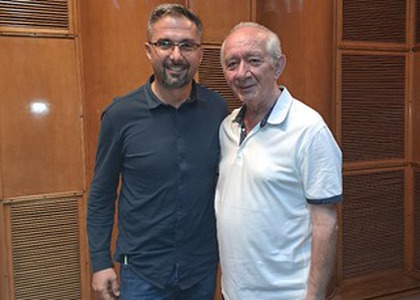> [Archived] Interviews

Interview with conductors Ciprian Țuțu and Cornel Groza
As part of the celebration of the 83rd anniversary of the Radio Academic Choir this year, on Thursday, June 15th, a concert will be held at the Radio Hall, which will be given by the musicians of the ensemble, prepared by Ciprian Țuțu, Cornel Groza, the conductor of the Transilvania Philharmonic Choir " from Cluj-Napoca being a special guest. We learn more information from the two musicians, with whom Ioana Țintea spoke:
Mr. Ciprian Țuțu, the Academic Radio Choir, which you have led since 2016, is celebrating its 83rd anniversary, and for the concert on June 15th, you have a special guest, a musician with extensive experience in choral art. Shall I leave it up to you to give us more details and tell us how this collaboration came about?
It is a great pleasure to have maestro Groza in Bucharest. He's a musician I've been following with great admiration for so long and I've been very close to your projects from a distance, even if I've never confessed it to him or maybe more lately I should say so, somehow I dare say , like an arc over time, I think we are connected by something. We are connected by the fact that although I am from Brașov and graduated from schools in Brașov and Bucharest, I had master Nicolae Bica by my side who is a disciple of master Pop Dorin. Either maestro Groza is the most important disciple of maestro Pop Dorin, or, somehow, I think I also took over an important part of the Cluj choral school, even if I didn't graduate from the conservatory in Cluj. That's it, like a little soul introduction. I feel very close to the Cluj school, to that style of work, to the repertoire of composers from Cluj, but to answer your question now very concisely, our meeting last year in Timișoara, I think that was the moment that represented the click . I'd had for the idea of a collaboration for a long time, as it was supposed to be done in the old days between the choirs of the country and between the conductors of the country, but here the ice broke last year, in the spring, when we met and expressed my intention to the master, after that we saw each other at the summer concert in Cluj when I got more courage after talking to my superiors and noticed that such a project could take shape. Finally, all in all, we have reached this moment of grace, in which we have maestro Groza in our midst with a wonderful program of Romanian music, but I think the most interesting thing would be for him to share his ideas and thoughts with us with which he came to Bucharest.
Maestro Cornel Groza, to enter the working laboratory, how do you describe the collaboration with the musicians of the Radio Academic Choir and how do you perceive the collective's response?
Very good. It seems very normal to me that when a foreign conductor comes there is maximum concentration because he brings new things every time. The working method is new, the repertoire is new, it is absolutely natural. I found a very large opening. Honestly, I came with excitement. I don't like working abroad so to speak and I'm cautious in deciding to do so, because Ciprian invited me, I was very pleased to tell you honestly. It was a challenge to come to the heart of the Capital, to one of the best choral formations in the country. I came with emotion, but I also came with interest and pleasure. Why did we come up with Romanian music? Because I am obliged, I say to our composers to make Romanian music. It may not have a very large audience, but it is our obligation to do it and we came and I am very happy that people have responded positively.
As you said, you propose an exclusively Romanian program. What were the criteria that guided you in the selection of works?
The very title of the concert explains this, Romanian choral journey, I tried to cover as large an area of the country as possible, because we have composers from north to south and from east to west. I started from Satu-Mare and arrived somewhere in Iași, I arrived in Reșita, I arrived in Bucharest, Ploiești etc. I tried to cover both stylistically and territorially, somehow, the areas.
What is the atmosphere you want to create for this special event?
One of interest. For us it has already been, it has been established that there is interest and now we have to see what the public says. I'm looking forward to it. I'm not very optimistic that the public perception will be great, because our public deteriorated, so to speak, after 1990 and the choral culture started to disappear and kind of disappeared really, but maybe curiosity will drive people to come at the concert to see new things.
In the future, you intend to collaborate with other choirmasters from the country and why not also from abroad, Mr. Ciprian Tuțu?
Why not. I'm very open to that. We see what we can achieve in the future. For now we have this season finale. After next week's a cappella concert, the season closes with Mahler's 3rd Symphony, and we will continue to prepare intensively for the Enescu festival. In the next season we will reveal the surprises.
Translated by Cosmin-Ionuț Petriea,
University of Bucharest, Faculty of Foreign Languages and Literatures, MTTLC, year I
Corrected by Silvia Petrescu














